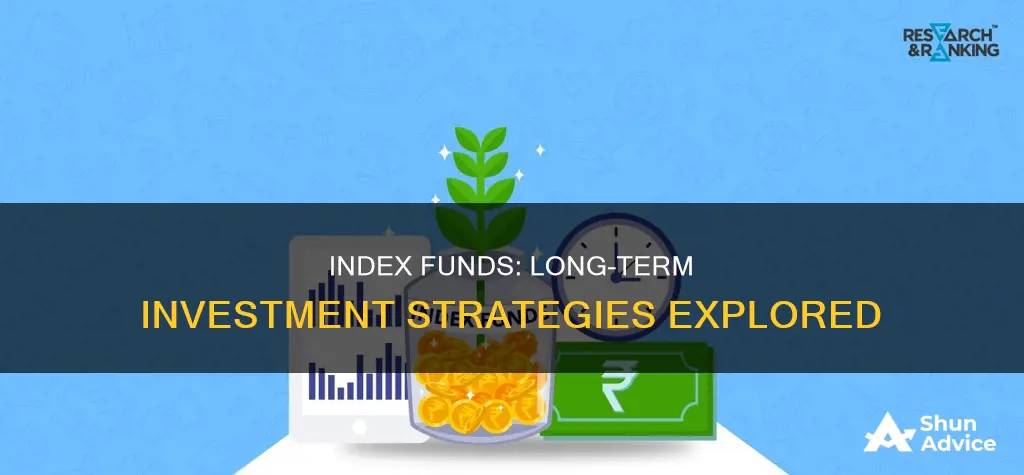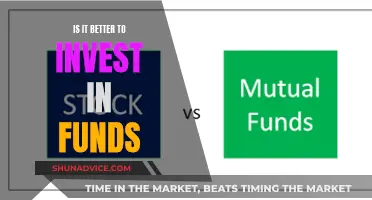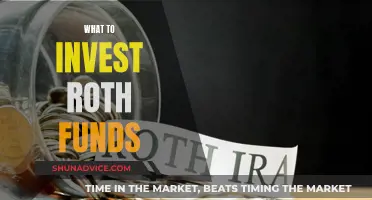
Index funds are a great investment for building wealth over the long term. They are a group of stocks that aim to mirror the performance of an existing stock market index, such as the S&P 500. Index funds are a passive investment strategy, meaning they don't require active management. This makes them a low-cost investment option.
There are thousands of stocks available to investors, but if you don't want to spend hours researching individual stocks, index funds are a great option as they provide exposure to a wide variety of stocks with a single purchase.
When choosing an index fund to invest in, it's important to consider the fund's expense ratio, investment minimum, and how closely it tracks the performance of the index. Here are some of the best index funds to invest in for the long term:
- Vanguard S&P 500 ETF (VOO)
- Vanguard Total Stock Market (VTI)
- Vanguard Total International Stock Market (VXUS)
- Vanguard Total Bond (BND)
- Fidelity ZERO Large Cap Index (FNILX)
- Vanguard Russell 2000 ETF (VTWO)
- SPDR S&P 500 ETF Trust (SPY)
- iShares Core S&P 500 ETF (IVV)
- Schwab S&P 500 Index Fund (SWPPX)
| Characteristics | Values |
|---|---|
| Name of Index Fund | Vanguard S&P 500 ETF |
| Overview | As its name suggests, the Vanguard S&P 500 tracks the S&P 500 index, and it’s one of the largest funds on the market with hundreds of billions in the fund. |
| Expense Ratio | 0.03% |
| 5-year Annualized Return | 16.0% |
| Who is it Good For? | Great for investors looking for a broadly diversified index fund at a low cost to serve as a core holding in their portfolio. |
| How to Buy | The fund can be purchased directly from the fund company or through most online brokers. |
What You'll Learn

Vanguard S&P 500 ETF
The Vanguard S&P 500 ETF (VOO) is a highly attractive option for investors looking for a broadly diversified index fund with low costs. Here's why this fund stands out as a solid choice for long-term investment:
Overview and Performance
The Vanguard S&P 500 ETF began trading in 2010 and is backed by Vanguard, a powerhouse in the fund industry. As the name suggests, this exchange-traded fund (ETF) tracks the Standard and Poor's 500 (S&P 500) index, which is one of the most widely followed stock market indices globally. With hundreds of billions of dollars in assets, it is one of the largest funds in the market. The fund aims to replicate the performance of the S&P 500, providing investors with exposure to 500 of the largest US companies, which make up about 75% of the total value of the US stock market.
Over the past five years, the Vanguard S&P 500 ETF has delivered an impressive annualized return of 16.0%. This track record underscores the fund's ability to generate solid returns over the long term, making it a compelling choice for investors seeking consistent performance.
Low Costs
One of the biggest advantages of the Vanguard S&P 500 ETF is its low expense ratio of 0.03%. This means that for every $10,000 invested, you would pay only $3 in annual fees. The fund's low costs make it an attractive option for cost-conscious investors, allowing them to maximize their returns by minimizing expenses.
Broad Diversification
By tracking the S&P 500 index, the Vanguard S&P 500 ETF offers immediate and broad diversification. Investing in this fund provides ownership of a wide range of companies across various sectors and industries. This diversification helps to lower investment risk compared to owning a few individual stocks.
Accessibility
The Vanguard S&P 500 ETF can be easily purchased directly from Vanguard or through most online brokers. There is no minimum investment amount, making it accessible to investors with varying budgets. This feature particularly appeals to beginners who may be starting with smaller amounts and gradually building their investment portfolios.
Suitability
The Vanguard S&P 500 ETF is well-suited for investors seeking a broadly diversified, low-cost fund to serve as a core holding in their portfolio. It is ideal for those who want exposure to the overall growth of the US economy and are willing to hold their investments for the long term. With its strong performance, low costs, and accessibility, the Vanguard S&P 500 ETF is a compelling choice for long-term investors.
Money Market Funds: When to Invest for Maximum Returns
You may want to see also

Vanguard Total Stock Market
The Vanguard Total Stock Market Index Fund (VTSAX) is a mutual fund that provides exposure to the entire U.S. equities market, consisting of thousands of publicly traded companies. This includes small-cap, mid-cap, and large-cap companies, as well as growth and value stocks traded on the Nasdaq and NYSE.
The fund employs a representative sampling approach to approximate the entire index and its key characteristics. As of December 30, 2021, VTSAX held 4,149 stocks and controlled net assets of $300 billion. Technology, financial, industrial, healthcare, and consumer service companies make up its largest holdings.
VTSAX has an extremely low expense ratio of 0.04% and requires a minimum investment of $3,000. The fund is best suited for moderately to highly risk-tolerant investors seeking low-cost exposure to the U.S. stock market. It could also function as a single domestic equity fund in a portfolio.
VTSAX can be purchased directly through Vanguard or via a broker's mutual fund portal. There is also an ETF equivalent: the Vanguard Total Stock Market ETF (VTI).
The Global Investment Hub: Where Funds Call Home
You may want to see also

Vanguard Total International Stock Market
Vanguard Total International Stock Index Fund is a mutual fund that aims to track the performance of a benchmark index that measures the investment return of stocks issued by companies located in developed and emerging markets, excluding the United States. The fund's net expense ratio is 0.18%, and it has total net assets of $183.388 billion.
The fund provides a way to gain exposure to the international stock market, which can offer several potential benefits for long-term investors. Firstly, international diversification can help reduce the risk associated with investing in a single market. By investing in a variety of countries and regions, investors can lower the impact of country-specific or regional economic downturns, political events, or other factors that may affect a particular market.
Secondly, investing in international stocks can provide access to different sectors and industries that may not be as prominent in the US market. This can help investors capitalize on growth opportunities in emerging markets or sectors that may be underrepresented in their domestic portfolios.
Additionally, investing in international stocks can be a hedge against currency fluctuations. If the US dollar weakens relative to other currencies, investments in international stocks can provide a buffer against the negative impact on US-based investments.
It is important to note that investing in international stocks also comes with certain risks. These include political and economic instability in certain countries, less stringent regulatory environments, and fluctuations in currency exchange rates.
When considering Vanguard Total International Stock Index Fund or any other index fund for long-term investment, it is crucial to conduct thorough research, assess your investment goals and risk tolerance, and consult with a qualified financial advisor to ensure the fund aligns with your investment strategy and financial objectives.
What's the Return on Investment for Founders?
You may want to see also

Vanguard Total Bond
One of the main advantages of investing in Vanguard's BND is its low expense ratio of 0.03%, which means lower investment fees and potentially higher total returns. This is a significant advantage, especially in the current financial landscape, where bond investors are warier due to rising interest rates.
BND also offers the benefit of being a passive index fund, which means it is passively managed and aims to replicate the performance of the underlying index. This passive management style contributes to keeping costs low and makes BND a good choice for long-term investors who want to lock in the returns of the overall bond market.
Additionally, BND provides exposure to the broad domestic bond market by tracking the Bloomberg U.S. Aggregate Float Adjusted Index, which holds over 11,000 bonds of multiple maturities and a range of credit qualities. As a result, BND has an intermediate duration of 6 years and a 5.3% yield to maturity.
In summary, Vanguard's BND is a well-diversified, low-cost index fund that provides exposure to the broad domestic bond market. With its low expense ratio and broad range of bond types, BND allows investors to create a tailored bond portfolio suited to their specific investment goals and risk tolerance, making it a good option for long-term investing.
SS Funds: Where Are Your Contributions Invested?
You may want to see also

Fidelity ZERO Large Cap Index
The Fidelity ZERO Large Cap Index Fund is a great option for investors looking for a broadly diversified index fund at an extremely low cost. Here are some key features and benefits of the fund:
No Expense Ratio
The fund has a 0% expense ratio, which means investors don't have to pay any annual fees on their investments. This is a significant advantage, as it allows investors to keep more of their money invested and compound their returns over time.
Broad Diversification
The fund tracks the Fidelity U.S. Large Cap Index, which includes more than 500 U.S. large-cap stocks. This provides investors with immediate diversification across a wide range of companies and sectors, reducing the risk associated with investing in individual stocks.
Strong Performance
The fund has delivered solid returns, with a 5-year annualized return of 16.0%. As of mid-May 2024, the fund was up about 12%, closely mirroring the performance of the S&P 500 index.
Accessibility
The Fidelity ZERO Large Cap Index Fund has no minimum investment amount, making it an attractive option for beginner investors who want to start investing with a small amount of money.
Reputable Fund Company
Fidelity is a well-known and investor-friendly fund company. By choosing this fund, investors can benefit from Fidelity's expertise and low-cost investment options.
How to Buy
The fund can be purchased directly from Fidelity or through most online brokers, making it convenient and accessible for investors.
Overall, the Fidelity ZERO Large Cap Index Fund is an excellent choice for long-term investors seeking a broadly diversified, low-cost index fund with strong performance and the flexibility of a low minimum investment.
Best Banks for Mutual Fund Investments in Pakistan
You may want to see also
Frequently asked questions
Some of the best index funds to invest in for the long term include the Vanguard S&P 500 ETF, SPDR S&P 500 ETF Trust, iShares Core S&P 500 ETF, Schwab S&P 500 Index Fund, and the Vanguard Total Stock Market ETF.
Index funds offer several benefits for long-term investors, including lower costs compared to actively managed funds, diversification across a wide range of stocks or bonds, lower risk due to diversification, tax efficiency, and minimal investment research required.
When choosing an index fund for long-term investing, consider factors such as the fund's expense ratio, investment minimum, tracking performance, and how closely it aligns with your investment goals and target market segment.
Some potential downsides of investing in index funds for the long term include the inability to beat the market, short-term downside risk during market downturns, and owning a large number of stocks that may include companies you don't prefer.
To invest in index funds for the long term, you can open a brokerage account or an account directly with a mutual fund company that offers the index fund you're interested in. Consider factors such as costs, fund selection, convenience, and trading costs when deciding where to buy your index funds.







